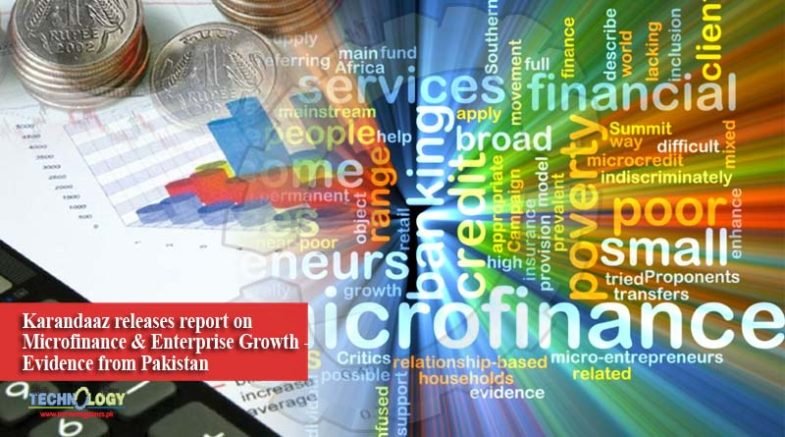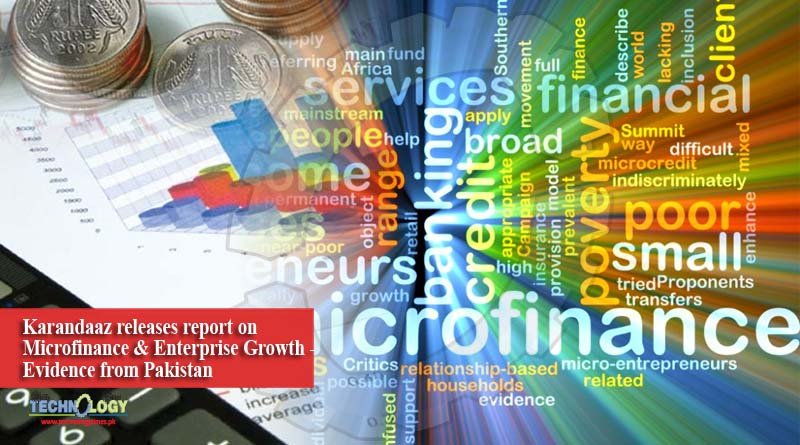The impact of microfinance has been a subject of much debate over recent years in Pakistan.
 While numerous studies have been conducted over the last decade, these have mainly focused on impact in terms of household income, personal assets, and socioeconomic indicators including economic status, children’s education, housing, women empowerment, and health expenditure and child immunization.
While numerous studies have been conducted over the last decade, these have mainly focused on impact in terms of household income, personal assets, and socioeconomic indicators including economic status, children’s education, housing, women empowerment, and health expenditure and child immunization.
A new study released by Karandaaz, titled “Microfinance and Enterprise Growth – Evidence from Pakistan” presents an alternative view, focusing on the impact of microfinance on job creation and enterprise growth. The employment profile of micro businesses is especially important for a country like Pakistan where the challenge of job creation, particularly for women and youth, is immense.
Quantitative data for the report was collected through a survey of 125 micro enterprises. The sample was selected to ensure diversity of geography, economic sector, gender, and the type of microfinance provider i.e., bank vs. non-bank. The average interest coverage of the micro enterprises studies is 10.2 times and the average debt service ratio is 2.0 times. Debt equity ratio is 7.0 percent, indicating that the micro enterprises are not highly leveraged. The average assets of the industry per micro enterprise stand at PKR 1.5 million.
The asset turnover for the industry, on average, is 1.1 times. Average monthly income of micro enterprises is about PKR 13,000 (and average distributable monthly income is PKR 41,000). The gross profit margin is 37 percent and the net profit margin is 11 percent. Financial cost is 4 percent of overall operating expenses, and 77 percent of the operating cost comprises salaries, wages and owners drawing. The report finds that on average, a micro enterprise employs 2.6 persons on a full time basis; 40% of these are women.
Pakistan has a youth bulge, with more than 69 percent of the population under the age of 30 and more than 4 million young people entering the job market every year. Estimates suggest that the economy needs to generate 1.5 – 2.5 million jobs annually to absorb these labour market entrants.
The report finds that on average, the jobs that 45 percent of the jobs that the micro enterprise sector directly supports are for youth i.e. in the 20-34 years’ age group. It was found that women-led businesses employ more women: the 57 women-led micro enterprises in the sample employed 101 women whereas total women employed by 68 men-led micro enterprises was 15. It is evident that self-employment and entrepreneurship will be a critical contributor in meeting the job creation needs.
In terms of revenue the report finds that on average, a micro enterprise earns PKR 1.6 million in annual revenue. However, this varies considerably across economic sectors, being considerably higher in trading and manufacturing sectors. Average fixed assets for the sample were calculated to be PKR 1.5 million, with highest asset base in agriculture sector due to landholding. Women-led micro enterprises tend to be smaller, earning 63 percent of what their male counterparts earned as revenue in a year.
Given that the bulk of the enterprises in Pakistan are micro, small and medium, the microfinance industry can play a pivotal role in growing the size of the economy, and in turn, support employment of millions. The report can be found on the Karandaaz website.
CEO Karnadaaz Pakistan, Mr. Ali Sarfraz while speaking about the significance of the report said “This research will help in building knowledge about the role of microfinance sector in supporting economic growth and supporting jobs. Although there is mixed evidence that microfinance can alleviate poverty, yet the additionality that it offers by increasing access to finance is at times overlooked. The findings of this report sponsored by Karandaaz Pakistan validate that our investments in microfinance are directionally correct in supporting jobs and increasing revenues for micro enterprises. We hope that further research on microfinance will fill the information gaps that will help the industry to take a deeper look at the delivery costs and product offering for its customers.”
Karandaaz Pakistan is supporting micro, small and medium entrepreneurs by increasing access to finance for unbanked populations through leveraging digital technologies, developing and disseminating evidence-based insights, and encouraging innovation in financial space. Karandaaz Pakistanis funded by UK’s Department for International Development (DFID) and the Bill & Melinda Gates Foundation.
